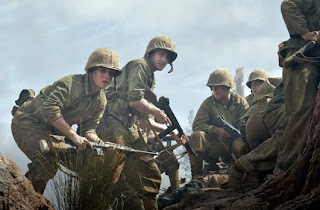"Do not let your hearts be troubled. Trust in God; trust also in me." (John 14:2)
Here is a mystery in my ever-shrinking mind: Why do I get so easily disheartened? Why is discouragement and despair always so darn close to me?
Maybe it's the same for you. Why is it so easy to get discouraged?
You see, lately I've been preparing for an eight-day journey to New Mexico and Colorado, places with mountains, mesas, wilderness and, in the case of NM, volcanoes. My adventurous side is compelling me to leave cubicle and florescent lights behind to seek God where I believe He is most easily found — outside our busy zones. It's hard to hear God's voice in the midst of the concrete jungle and structured days. So I need to get away to refocus and retool.
So I planned a vacation — on the cheap — to be frugal with the finances God has blessed me with and step out of my comfort zones. I figure I need $200 total for eight days of driving, camping, and a few meals. Most of my food expense is camp food — you know, dried stuff and powdered stuff. Stuff that costs pennies compared to eating out. I have a circular route of 1,200 miles planned, with stops at seven campgrounds and a bunch of national monuments and parks. I head out alone (for such is the season of my life) with only my camera crew coming with me... well, not really a crew, but I do have a few video cameras and my still camera. I plan to document the entire excursion. I document everything. It annoys my family. But I'm convinced that one day it'll pay off.....
For some, a $200 vacation seems like no great expense, but for me it meant having to skip paying a bill or two. I can't save money every month like most people (I already live very frugally), so taking a vacation means skipping something financial. I hate to do that but such is the price of rest. Besides, I plan to make up those bills next month.
But discouragement came when I checked my bank numbers. What I saw killed my spirit. Always does. If I make it through the trip with no emergency expenses, I'll return with a zero balance (hopefully). If something comes up during my trip or some financial entity decides to withdraw money when I'm gone... I'm sunk. So discouragement has crept in. I'm now looking to cut even more corners. Pretty soon I think I'll have a circle!
Feelings of entrapment are choking me. It seems that I can't ever go anywhere, even if my heart and soul really need it. There is no escape from circumstance. Have you ever felt trapped by where you are? For a long period of time? Kills the spirit, doesn't it?
I searched the Bible this evening for help with my discouragement problem. Maybe scripture has something to say. Usually it does. This time it didn't help much. At least not that I could see. I just got back the same old answer: trust in God even if you don't understand why.
Even though discouragement was a major problem plaguing biblical figures, most times it was tied directly to the execution of a God-given mission. It wasn't just simple circumstance. Usually God gave a specific command (like Joshua's charge to take over the Promised Land) and then opposition to that command arose to cause discouragement. But what if your discouragement doesn't come from opposition to a divine command? What if it is just plain circumstance? Is there such a thing as "just plain circumstance"? I don't know.
At the top of this blog entry I quoted our Lord Jesus talking to his disciples, one of whom, he just announced, would deny him. They didn't understand what was happening to them, so Jesus basically said, "Trust me." I've followed God through this valley and I have no other plans for the future. Even though I don't understand why I'm going through such a tough financial time, I know that God has been faithful to me during this time. He must have been, for I'm still here, you know, with a roof over my head and food in my belly! If he had forsaken me, I'd be lost out in the middle of the barren desert with no hope. But I have hope. As long as I live. Why? Here's God's promise:
"Keep your lives free from the love of money and be content with what you have, because God has said, “Never will I leave you; never will I forsake you.” So we say with confidence, “The Lord is my helper; I will not be afraid. What can man do to me?” (Heb 13:4-6)
Man can take my car, he can take my house, he can take my iPhone (if I had one)... but he cannot take away the love of God for me, even in the midst of my poverty. Even when we feel unloved we still are loved. There must be some assurance in that, right?
Be God's.
.











